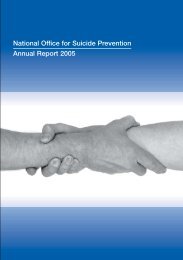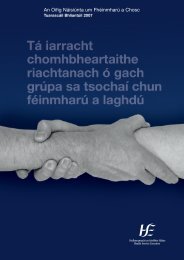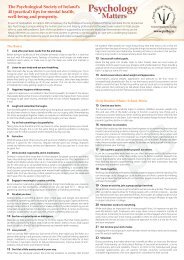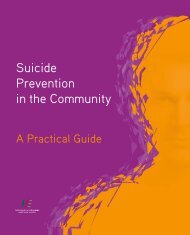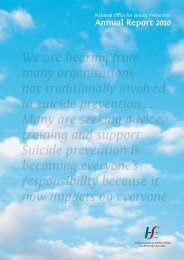Dr. Patrick McSharry - National Office for Suicide Prevention
Dr. Patrick McSharry - National Office for Suicide Prevention
Dr. Patrick McSharry - National Office for Suicide Prevention
You also want an ePaper? Increase the reach of your titles
YUMPU automatically turns print PDFs into web optimized ePapers that Google loves.
NOSP 2012 Forum<br />
Royal Hospital, Kilmainham Dublin 8.<br />
Educating General Practitioners and<br />
Primary Care staff to respond to<br />
Suicidal Behaviour<br />
<strong>Dr</strong>. <strong>Patrick</strong> Mc Sharry<br />
General Practitioner, Enniscrone, Co. Sligo.<br />
<strong>Suicide</strong> a reminder of the impact:<br />
• In excess of 500 suicides every year in Ireland.<br />
• 11,000 cases of DSH in Emergency Departments with<br />
an estimated 50-60,000 managed in the community.<br />
• Objective health indicators of burden using DALY<br />
suicide is twice the burden of Diabetes (accounting <strong>for</strong><br />
2.3% of all disease worldwide)<br />
• The impact on family, friends and community immense<br />
and immeasurable.<br />
• General Practice is well placed in the role of suicide<br />
prevention.<br />
Reach out- <strong>National</strong> strategy <strong>for</strong> Action on suicide<br />
<strong>Prevention</strong> 2005-2014<br />
- “agree, plan and deliver a programme of<br />
education and training on suicide prevention<br />
<strong>for</strong> the relevant members of the primary care<br />
team. ”<br />
- As part of this action the <strong>National</strong> <strong>Office</strong> of<br />
<strong>Suicide</strong> <strong>Prevention</strong> (NOSP) and the ICGP are<br />
developing such a course.<br />
ICGP/NOSP Research<br />
• Focus group meetings from August 2011-<br />
January 2012 involving representatives from<br />
relevant groups held in ICGP.<br />
• Educational Needs Assessment of GPs and<br />
primary care staff & patients on <strong>Suicide</strong> and<br />
deliberate self harm with the research being<br />
used to shape a course in Primary care.<br />
International literature review<br />
• International research shows physician<br />
education in depression recognition and<br />
screening and treatment reduces suicide<br />
rates.<br />
• Restricting access to lethal means (gun<br />
law/medication legislation/barriers at high<br />
risks locations) has also being shown to lead<br />
to reductions in suicide rates.
Aim<br />
• The aim of this research is to conduct a needs<br />
assessment of members of the primary care<br />
team in resect of dealing with patients who<br />
present with suicidal ideation or deliberate<br />
self harm.<br />
Method<br />
• Qualitative interviews with representatives from<br />
groups followed by focus group discussion to<br />
prioritise key items <strong>for</strong> inclusion in the<br />
questionnaire.<br />
( Focus Group: GPs & GPR, PNs,Patient Representative (SOS), Psychiatrists, <strong>Suicide</strong> Resource<br />
officer, NOSP, ICGP Directors of Mental Health, Research, Education & Quality & Standards, )<br />
• Delphi process 5 page online & postal<br />
questionnaire sent to GPs, Practice Nurses, Allied<br />
Health Professionals, Patients and Service Users<br />
(through representative organisations)<br />
Results<br />
• 117 replies.<br />
• GPs made up 51% of respondents with<br />
Practice nurses accounting <strong>for</strong> 31%.<br />
• Allied health professionals made up 5% and<br />
patient representatives accounting <strong>for</strong> 13%<br />
• 71% of the study population was female.<br />
• 60% of professional respondents felt that a<br />
suicide had impacted on their practice with<br />
27% feeling it impacted on the subsequent<br />
relationship with the deceased persons<br />
relatives.<br />
• Only one respondent reported having a<br />
written practice protocol <strong>for</strong> dealing with the<br />
suicide of a patient.
Com<strong>for</strong>t asking a patient about<br />
suicidal thoughts<br />
Current level of knowledge of suicide<br />
risk assessment<br />
100<br />
90<br />
80<br />
70<br />
60<br />
50<br />
40<br />
30<br />
20<br />
10<br />
0<br />
GPs PNs AHPs<br />
Com<strong>for</strong>table<br />
Uncom<strong>for</strong>table<br />
Not applicable<br />
• 25 % of total group felt their level of<br />
knowledge was below average.<br />
• This varied greatly within the groups with only<br />
2% of GP feeling their knowledge was below<br />
average compared to 61% of Practice nurses.<br />
Current level of knowledge of suicide<br />
risk assessment.<br />
Other key points<br />
80<br />
70<br />
60<br />
50<br />
40<br />
30<br />
20<br />
10<br />
0<br />
GPs PNs AHPs<br />
Above average<br />
Average<br />
Below Average<br />
• 2/3 had no member of their practice <strong>for</strong>mally<br />
trained in suicide risk assessment.<br />
• 31% of GPs and 93% of PNs felt they did not have<br />
adequate training in suicide risk assessment.<br />
• 60% of all respondents felt they did not have<br />
adequate in<strong>for</strong>mation as to the best available<br />
resources specific to their area (HSE & Voluntary)<br />
• 93% felt Primary Care was not adequately<br />
resourced <strong>for</strong> management of suicidal patients.<br />
Format<br />
• 85% felt that other members of the primary<br />
care team had a role in suicide prevention<br />
including the receptionist. Modules on suicide<br />
awareness were there<strong>for</strong>e felt appropriate to<br />
include support non clinical staff.<br />
• 91% felt the need <strong>for</strong> structured training with<br />
the same amount displaying a willingness to<br />
partake. Time constraint being cited as the<br />
reason <strong>for</strong> the non willingness to participate<br />
Blended course comprising face to face modules<br />
along with online e-learning covering :<br />
• <strong>Suicide</strong> Awareness & Patient Testimony<br />
• Assessment of suicide risk<br />
• Problem Solving<br />
• Crisis <strong>Prevention</strong><br />
• Consultation skills
How Long away from practice?<br />
Total duration?<br />
Where should modules be run?<br />
In Conclusion<br />
• International evidence to support structured<br />
training reduces suicide rates<br />
• Need <strong>for</strong> further ongoing education amongst GPs<br />
& Primary Care team members<br />
• GPs & primary care team members are eager to<br />
partake in a blended course comprising (Elearning<br />
and face to face modules)<br />
• Preferably delivered at CME/CPD.<br />
• Over 90% felt primary care was not adequately<br />
resourced in dealing with suicidal patients.<br />
• <strong>Suicide</strong> <strong>Prevention</strong> e-learning module<br />
introduction video………………<br />
http://www.screencast.com/t/g96H2Sm0z



